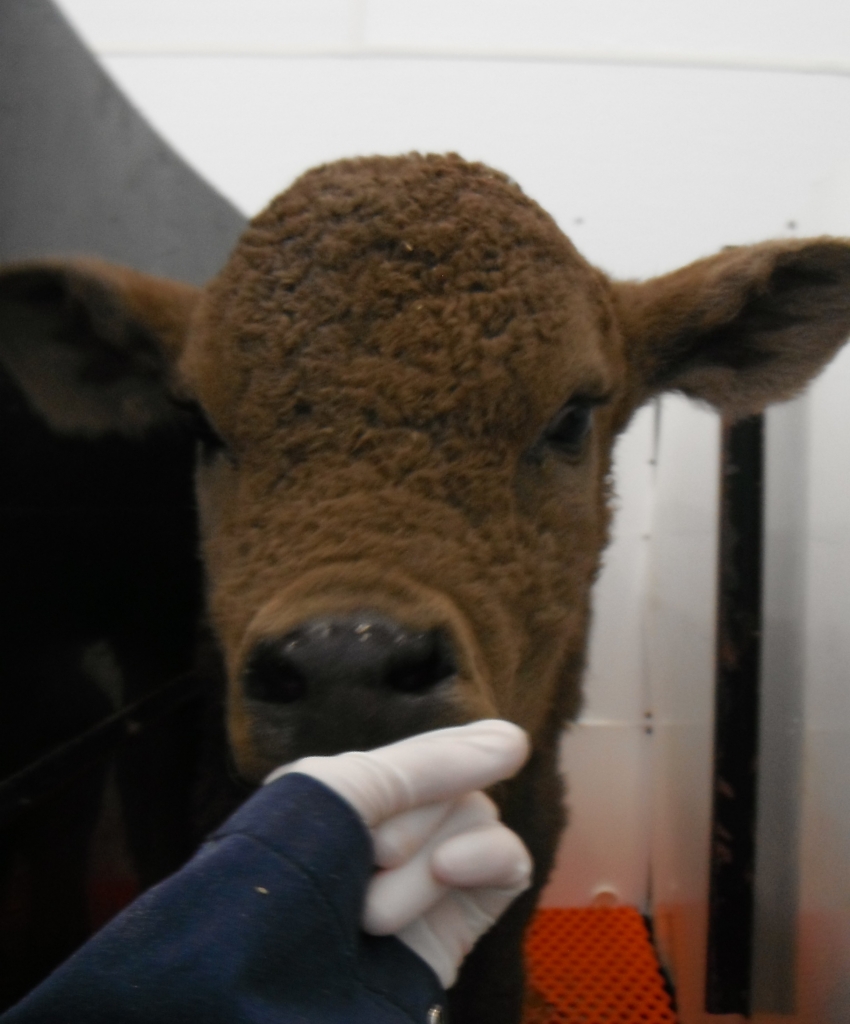|
Scouring Calves
Every spring ranchers are plagued with "scours". The word "scours" is just another word for diarrhea. There can be many different causes of scours and most can be prevented with better management of the living areas and through vaccinations. Calf scours is the most common symptom of illness in young calves and can be caused by several different viruses, bacteria and organisms. Most often it is a problem in the first month of life. Viruses like the rotavirus (most common) and bacteria like salmonella and E.coli, as well as coccidian and other internal parasites can cause scours. When attacked by these infectious agents, the calf's gut is still so immature; making it the weakest point of the calf's system, the lining of the bowel is damaged and results in the loss of large amounts of body fluid into the gut. The calf is quickly dehydrated, electrolytes are unbalanced and energy reserves become depleted. A calf is approximately 70% water at birth, so the loss of body fluids through diarrhea produces the rapid dehydration. The younger the calf, the greater the chance of death.
These are easily prevented by a proper vaccination of the dam before calving. We recommend using Scourguard 4KC, 6 weeks and again 3 weeks before calving in non-vaccinated females. For every subsequent year thereafter, you only need to vaccinated, 3 weeks before the cows are due to start calving. There are many other scours vaccines on the market, please call us for more information on them.
There are several management strategies to help prevent scours from infecting your calf crop.
- Calve heifers in a separate area from older cows. Their calves' immunity levels are typically lower than calves from older cows.
- Avoid wet calving barns and areas if possible, try to calve on fresh bedding or dry areas if the weather permits. The ideal calving environment would be a fairly steep hillside pasture with a windbreak, accompanied by warm, dry weather. One of the primary causes of scours is a wet, muddy and cold calving environment.
- Provide portable calf shelters on pasture to keep calves dry and protected from chilling winds. It is also essential that these sheds be moved and cleaned out periodically.
- If calving in smaller spaces, turn the cow/calf pairs out to a clean pasture area or clean bedding as soon as possible.
- Isolate any scouring calves and treat immediately. Clean and disinfect the environment. Early isolation is critical to help aid in preventing the spread of scours to other calves.
- Have cows and heifers in good body condition, and on an appropriate nutrition program to help ensure calves are born healthy and strong.
- Vaccinate herd six and three weeks prior to the beginning of the calving season.
- Make sure that newborn calves receive adequate amounts of colostrum.
- Don't rely exclusively on vaccines, as they can't be 100% effective if the calves are born in a muddy area that is already infected with diseases.
|
The immediate treatment and most important is to administer fluids, electrolytes and energy. Fluid is essential, but the fluid cannot be absorbed from the gut unless it contains electrolytes (salts) in proper proportions. Scouring calves should receive at least 10% of body weight of fluids and electrolytes is scouring is mild, and more if it is severe. Use a high quality electrolyte mixture administered with a stomach tube, twice daily. Don't mix the fluid and electrolytes with milk, as it will cause the milk to curdle and be of no benefit. Antibiotics can be useful as well if your calf is suffering from an infection. Please call us for the proper antibiotic for your calves. If your calf is sick and you cannot seem to be getting the scouring under control with oral electrolytes, please contact us. Alberta Veterinary Center has an isolation scours ward that is cleaned 3 - 4 times daily and is monitored by the veterinarian and an animal health technologist. Here we assess your calf and usually put them on IV electrolytes and higher doses of antibiotics or other medications that they require. We CANNOT send these babies home with you to monitor on IV fluids because their body weights are so small and they are so sick that it is very easy to overdose them on medications.
|

|
| 

